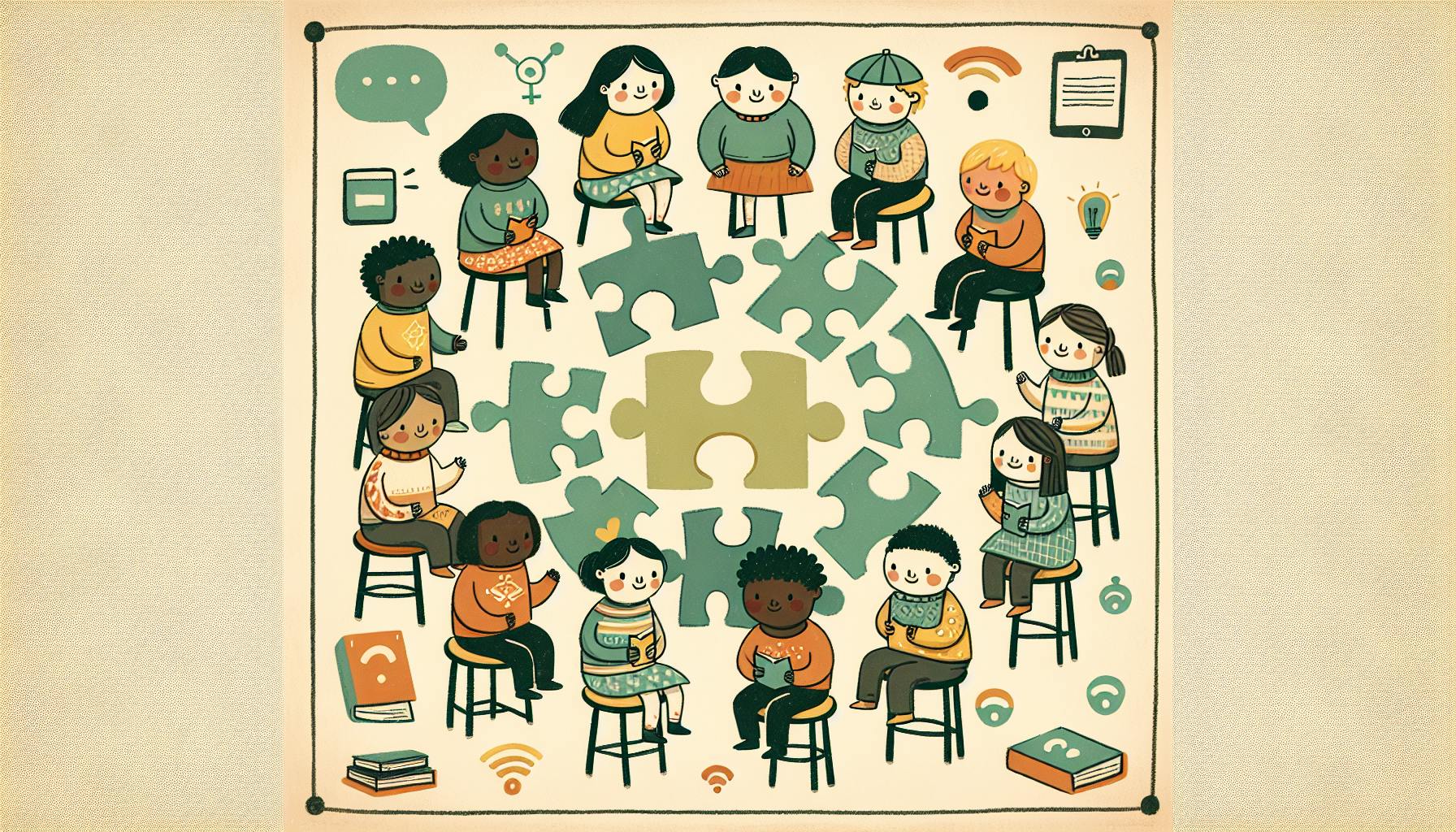Finding meaningful science fair projects for 5th graders can be a real challenge for teachers.
This comprehensive guide for teachers promises to make planning and executing winning science fair projects for 5th grade easy and enjoyable.
You'll discover the top 10 project ideas, step-by-step instructions for developing testable experiments, gathering materials, recording observations, analyzing data, creating visual displays, tips for captivating presentations, and evaluating outcomes to celebrate student success.
Introduction to Science Fair Projects for 5th Grade
Science fair projects provide an engaging way for 5th grade students to explore science topics that interest them. As a teacher, guiding students through the process of developing a science fair project teaches important research, critical thinking, and communication skills. This guide offers tips and resources to help 5th grade teachers mentor students in creating meaningful science fair projects.
Exploring the Benefits of Science Fair Projects
Science fair projects have many benefits for 5th grade students:
- Spark interest and engagement in STEM topics
- Build research, experiment design, and data analysis skills
- Boost confidence through independent investigation of a topic
- Allow creativity and choice in project development
- Develop scientific thinking and communication abilities
By participating in science fairs, students gain exposure to the scientific method and learn how to conduct experiments.
Selecting Winning Science Fair Topics
Choosing an appropriate topic is key to developing a successful science fair project. Consider these strategies for helping 5th graders select a topic:
- Brainstorm areas of interest from the 5th grade science topics list
- Determine if a topic can be tested through an experiment at home
- Ensure required materials are easily accessible
- Match topics to students' abilities and skill levels
Some winning 5th grade science fair projects have focused on testing the effects of different variables on plant growth, modeling weather phenomena, investigating properties of matter, and more.
Crafting a Compelling Research Question
A strong research question guides the entire science experiment. Here are tips for developing a focused research question:
- Frame the question around testing a specific variable
- Make the question clear, narrow, and answerable through an experiment
- Use the scientific method to inform the phrasing of the question
For example, "How does the amount of sunlight affect the growth rate of bean plants?" is an effective research question.
What are the top 10 science fair project?
Here are 10 great science fair project ideas for 5th grade students:
1. Investigating the Effect of Different Soil Types on Plant Growth
This project tests how plants grow in different soil types like clay, sand, potting mix, etc. Students can measure plant height over time to compare growth rates.
2. Measuring the Effect of Music on Memory
Students can test how different music genres affect memorization of words or numbers. A control group with no music can be used for comparison.
3. Creating a Solar Water Heater
Using basic materials, students can build a solar powered water heater to test temperature changes over time. This explores renewable energy.
4. Investigating the Effect of pH on Enzyme Activity
By changing pH, students can measure how enzyme activity is affected. This shows how acidity impacts chemical reactions in living things.
5. Measuring the Effect of Temperature on Electrical Resistance
Using wire and a multimeter, the resistance of conductors can be tested at different temperatures. This demonstrates scientific principles.
6. Building a Simple Wind Turbine
Students can construct small wind turbines to power LED lights. This explores mechanical energy conversion.
7. Testing Strength of Different Bridge Designs
Using materials like popsicle sticks or toothpicks, students can build different bridge models and test their strength by adding weights until structural failure. This is an engineering design challenge.
8. Investigating Which Materials Best Insulate Heat
By timing how long ice cubes last when wrapped in various materials, insulation properties can be compared. Everyday items like cotton, foil, and Styrofoam can be tested.
9. Observing Osmosis in Cells
Using eggs, students can observe the process of osmosis and diffusion across semi-permeable membranes. This demonstrates biology concepts.
10. Testing Paper Airplane Designs
Students can build different paper airplane models and measure flight distance and duration. Aerodynamics principles are explored through iterative testing.
What is the best science project for Class 5?
Here are some of the best science fair project ideas for 5th grade students:
Bouncing on a Trampoline
This project looks at how the height of a trampoline bounce changes depending on the weight of the person jumping. Students could test different weights and record bounce heights.
The "Magic" Leakproof Bag
Students can create a bag out of a plastic zipper storage bag that seems to defy gravity and doesn't leak water even when turned upside down. This demonstrates air pressure and density.
Clothespin and Popsicle Stick Airplanes
Students can build simple airplanes out of clothespins and popsicle sticks and test how far they fly when launched by hand. They can experiment with different wing shapes and angles.
Tornado in a Bottle
Using a plastic bottle, water, glitter or small pieces of paper, and dish soap, students can create a mini tornado and observe how tornadoes form.
Float or Sink Pop Cans
By crushing pop cans and placing them in water, students can observe differences in density and record whether crushed cans float or sink compared to normal cans.
These are just a few fun and easy science project ideas that demonstrate science concepts like gravity, density, pressure, and forces. Students get hands-on experience coming up with a hypothesis, testing variables, collecting data, and drawing conclusions. And they'll learn some really cool science facts along the way!
What are the topics for grade 5 science?
Here are some of the most common science topics studied in 5th grade:
Earth and Space Science
- Structure and layers of the Earth
- Landforms and changes in the Earth's surface caused by weathering and erosion
- The water cycle
- Weather patterns and severe storms
- The solar system, planets, stars, galaxies
Life Science
- Plant structures and functions
- Plant life cycles and reproduction
- Ecosystems and food chains
- Human body systems and functions
- Animal classification, structures, and adaptations
Physical Science
- Properties and states of matter
- Atoms and molecules
- Energy, heat, light, and sound
- Forces and motion
- Electricity and magnetism
5th graders typically learn about these topics through hands-on activities, experiments, projects, and demonstrations that connect the concepts to real-world examples relevant to where they live. For instance, they may study local weather patterns, plant life cycles in their area, organisms in a nearby ecosystem, or conduct experiments with household materials related to physical science concepts. Tying the learning to their surroundings helps cement understanding.
What are testable questions for science fair projects 5th grade?
Science fair projects allow 5th grade students to explore scientific concepts through hands-on experiments. When coming up with a testable question, it's important to choose a topic that interests your student and can be tested using the scientific method.
Here are some examples of testable questions for 5th grade science fair projects:
How does temperature affect crystal growth?
- Students can grow crystals using different solutions and observe how temperature impacts crystal size and shape. This allows them to learn about states of matter.
How do different liquids affect how quickly an ice cube melts?
- Students can measure how long it takes ice cubes to melt when placed in different liquids like water, oil, soda etc. This teaches them about heat transfer.
How does the angle of a ramp affect the distance a toy car travels?
- Students can build ramps at different angles and test how far toy cars roll down them. This demonstrates concepts of potential and kinetic energy.
How does the amount of light affect plant growth?
- Students can grow plants under different lighting conditions to observe the effects on plant height, leaf number etc. This illustrates photosynthesis and plant biology.
The key is choosing questions that allow students to measure data and draw conclusions. This teaches the scientific method and critical thinking skills. Review science fair project ideas for 5th grade when helping your student select a topic.
sbb-itb-bb2be89
Preparing and Executing the Experiment
Executing a successful science experiment requires careful preparation and precise execution. As a teacher guiding 5th graders through science fair projects, focus on facilitating engaging hands-on learning experiences.
Gathering Data and Materials for Science Experiments
- Recommend students use household materials that are safe and easy to acquire. Simple materials like paper, cardboard, basic craft supplies, food items, and recycled containers work well.
- Have students research reliable sources to gather background information and data to inform their hypothesis and procedures. Useful sources include science textbooks, library books, museum websites, and other vetted educational sites.
- Compile a classroom kit of basic supplies like tape, scissors, rulers, notebooks, and pencils to have on hand. Consider creating a sharing system for students to borrow specialty items as needed.
Implementing Procedures Safely and Accurately
- Supervise all experiments to ensure safety protocols are followed properly. Review safety rules and demonstrate proper handling of any potentially hazardous materials.
- Guide students to follow procedures precisely as outlined to control variables and yield reliable results. Encourage recording detailed notes on each step.
- Allow flexibility for iterations and improvements if initial trials reveal flawed procedures. Discuss troubleshooting techniques.
Recording Observations with Precision
- Instruct students to record qualitative observations through detailed notes, drawings, photos, or videos. Emphasize thorough, objective descriptions.
- Have students take precise quantitative measurements with metric rulers, scales, timers, thermometers, etc. Stress the importance of accurate data.
- Consider using student-friendly apps, like Google Science Journal, to assist with gathering observational data.
Organizing and Analyzing Data Like a Scientist
- Help students organize recorded observations into user-friendly tables, charts, and graphs. Online tools like Google Sheets simplify data analysis.
- Explain basic statistical concepts like mean, percentages, rates of change, correlation vs causation, and margin of error. Guide analysis appropriate for 5th grade level.
- Compare results to background information gathered. Did the data support or contradict the original hypothesis? Why?
Drawing Conclusions from Experimental Results
- Facilitate constructive discussion around interpreting results and assessing hypotheses. What conclusions can reasonably be made given the data? How might the experiment be refined and expanded in future trials?
- Stress that "failed" experiments still provide learning opportunities if students can thoughtfully analyze their procedures, observations, and conclusions to determine improvements for next time. The scientific process involves ongoing questioning, testing, and refinement of ideas.
With thoughtful mentorship, 5th grade science projects grant meaningful opportunities to engage students in core aspects of the scientific process. Patience and creativity are key to guiding young scientists as they build critical thinking skills through hands-on discovery and analysis.
Creating a Standout Science Fair Presentation
Teachers can provide guidance to help students create an impactful science fair presentation that clearly communicates their project and findings.
Developing a Clear and Engaging Presentation
- Have students outline key sections to include in their presentation:
- Introduction
- Hypothesis
- Materials & Methods
- Results
- Conclusion
- Suggest students make supplements like posters, models, or prototypes to showcase the project.
Incorporating Visuals and Science Fair Boards
- Encourage the use of charts, graphs, photos to present experiment data and results.
- Colorful visuals grab attention and illustrate findings.
Assembling the Science Fair Board with Creativity
- Use borders, title headers, and section dividers to organize display boards.
- Incorporate photos, diagrams, and other graphics to showcase the project.
- Utilize color strategically to highlight important elements.
Practicing the Oral Presentation for Impact
- Have students rehearse presenting to build confidence.
- Focus on clearly explaining the science concept.
- Prepare for likely questions to demonstrate knowledge.
Showcasing the Project at the Science Fair
- Strategically place projects to maximize foot traffic and visibility.
- Have students engage fairgoers to explain their project and findings.
- Collect feedback for students to help further develop projects.
With thorough preparation and creative presentation, students can effectively showcase their science fair projects and communicate experiment outcomes. Teachers play a key role in guiding the development of impactful science fair displays.
Evaluating and Reflecting on Science Fair Outcomes
Teachers can utilize several methods to evaluate student learning and development of science process skills through science fair projects.
Reflecting on Student Growth and Science Skills
- Have students complete self-reflection forms about their research process, including questions like:
- What science concepts did you learn through this project?
- What research skills did you develop or improve?
- What challenges did you face and how did you overcome them?
- Assign journal prompts for students to write about their science fair experience, such as:
- Describe the most interesting thing you learned while doing your science project.
- What science process skills (observing, inferring, predicting, etc.) did you use?
- Create rubrics to assess science process skills like developing a hypothesis, designing procedures, collecting and analyzing data, drawing conclusions, and communicating findings.
Gathering Feedback from Judges and Peers
- Survey science fair judges on project qualities like creativity, effort, scientific thought, and skill development.
- Have students share constructive critiques on peers' projects.
- Encourage audience members to leave feedback or ask engaging questions.
- Review judges' rubrics and comments for areas of growth.
Evaluating Learning Objectives Through Projects
- Align science fair projects to curriculum standards for scientific investigation.
- Create project guidelines and rubrics that assess specific learning objectives.
- Evaluate projects on the degree students demonstrate target skills like:
- Asking scientific questions
- Developing models
- Planning investigations
- Analyzing data
- Using mathematical thinking
- Constructing explanations
- Engaging in arguments from evidence
Adjusting Teaching Approaches Post-Science Fair
- Identify common gaps in understanding or skill that projects revealed.
- Differentiate instruction going forward, providing extra support in challenging areas.
- Update science units and activities to better scaffold key science and engineering practices.
- Reflect on how science fairs can be improved to maximize learning.
Innovative Science Fair Project Ideas for 5th Grade
Science fair projects allow 5th grade students to explore scientific concepts through hands-on experiments and investigations. Choosing an innovative idea can help spark curiosity and engagement. Here are some creative science fair project suggestions suitable for 5th graders.
Science Fair Projects for 5th Grade at Home
- Test how different liquids affect the buoyancy of an egg. This allows students to learn about density at home using common household materials.
- Explore how sugar affects the rising process of yeast dough. Students can observe biological processes using ingredients found in most kitchens.
- Investigate how acidity impacts plant growth by watering plants with liquids of different pH levels. Everyday materials like lemon juice, vinegar, and baking soda can be used.
Last Minute 5th Grade Science Projects
- Evaluate how different surfaces like carpet, tile, and wood impact the speed of a toy car. This fast experiment teaches concepts of friction and gravity.
- Test how the shape of pasta impacts the time it takes to cook. Students can explore why certain shapes cook faster, learning about geometry.
- Investigate how salt impacts the freezing point of water by freezing salty and plain water samples. This demonstrates states of matter.
5th Grade Science Fair Projects with Food
- Explore how freezing, heating, or mixing different liquids affects a hard-boiled egg inside the shell. Students can apply scientific concepts through edible experiments.
- Test how antioxidants in fruits impact oxidation by leaving apple slices exposed to air. Students can measure browning rates, learning about botany.
- Investigate how acids in vinaigrette salad dressing impact vegetable color. Students can explore concepts of chemistry using familiar foods.
5th Grade Science Fair Projects with Plants
- Analyze how natural and artificial light impacts plant growth by exposing plants to various light sources. This teaches foundations of botany and ecology.
- Explore how microwaving seeds impacts the sprouting ability compared to untreated seeds. Students can learn about plant reproduction through this experiment.
- Test how salt, sugar, vinegar, baking soda, etc. affect the wilting rate of flowers. Students can identify what damages or preserves plants.
Science Fair Projects for 5th Grade Biology
- Investigate how antibiotics impact bacterial growth by exposing cultures to antibiotics. This demonstrates germ theory and microbiology.
- Analyze how different liquids impact an earthworm's ability to move by exposing earthworms to assorted liquids. Students learn about invertebrate biology.
- Explore what insects are attracted to different food baits by leaving various foods outdoors. Students can categorize insects and analyze data.
Conclusion: Celebrating Science Fair Success
Science fairs provide an exciting opportunity for 5th grade students to explore science topics that interest them through hands-on projects. This guide has covered key tips for successfully mentoring students through the process, from choosing a topic to presenting the finished project.
Key Takeaways for 5th Grade Science Fair Projects
- Select an experiment-based project that aligns with your student's interests and grade level standards. Focus on testable questions.
- Set a realistic timeline for research, experimentation, analysis, and putting together the presentation.
- Provide guidance on research skills, scientific method, data collection, and safe procedures.
- Have students reflect on what they learned and how they can build on their project in the future.
Building on Projects for Future Success
Students can continue developing their science fair project by:
- Repeating experiments with different variables or sample sizes
- Competing at school, district, or state-level fairs
- Expanding into a long-term research project across multiple years
- Exploring extensions into engineering, computer science, or mathematics
The science fair experience allows students to build critical thinking, communication, and research skills that will serve them well in future science endeavors.


